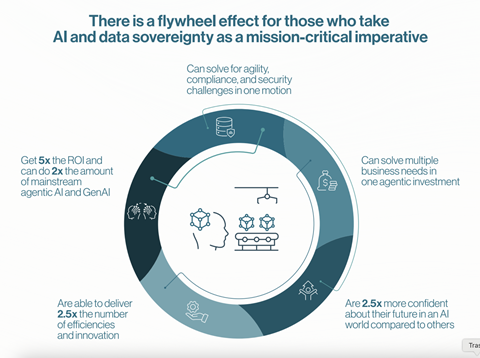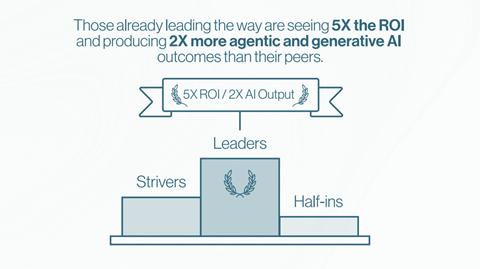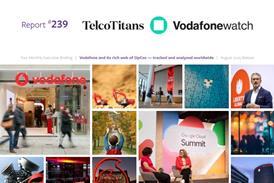- The traditional business model of a telco is no longer viable due to intense pressure from AI-native competitors, rising network complexity, and shrinking opportunities for monetisation.
- New research from EDB reveals that while most telco leaders plan to build their own AI platforms, a leading 10% have already embraced AI and data sovereignty and are achieving five times the return on investment.
- These high-performing telcos are creating a virtuous cycle, or ‘AI flywheel’, by unifying sovereignty across core and edge operations, allowing them to combine their data and AI for secure, real-time impact.
- The findings underpin enterprise-grade Postgres as a key technological foundation for this shift, providing an open-source, flexible, and resilient platform that meets cost, compliance, and edge computing demands.

There is an urgency for change across the telecommunications industry; the forces for transformative change are no longer subtle signals on the horizon — they are immediate, pressing, and global. Every telco, regardless of size or geography, is standing at a crossroads where the wrong choice could limit growth for years to come. The reasons for this urgency are many:
- AI-native digital challengers are redefining service expectations and speed of innovation.
- Over-the-top (OTT) disaggregation is siphoning off value that used to sit firmly in the telco domain.
- Network complexity — driven by IoT proliferation, fibre densification, and heterogeneous infrastructure — is exceeding human management capacity.
- Monetisation windows are shrinking, with value creation increasingly happening in micro-moments that require instant response.
- Automation gaps prevent operators from reducing costs quickly enough to match competitive pressures.
- Regulatory and customer expectations around data sovereignty, security, and trust are rising steeply.
- Data gravity is shifting toward the edge, requiring AI and data to co-locate for real-time impact.

In short: the old model of the telco as ‘just a pipe’ no longer fits the reality of the market. Remaining a ‘pipe-only’ player is like competing in a sprint while starting ten meters behind the line — the disadvantage compounds with every step.
Notably, this industry produces more data than almost any other, second only to banking, financial services, and insurance (BFSI). Yet BFSI and healthcare often dominate the headlines when it comes to groundbreaking applications of AI and data sovereignty. The question for telcos is simple: “Why not us?”.
“In an industry that has underperformed compared to its native digital competitors, telcos now have the chance to lead, harnessing their natural assets — data at the edge and core, and a built-in mandate for sovereignty — to drive the much-anticipated economic transformation. Open, secure, Postgres-based platforms for AI and data are the foundation of the transformation this industry has been waiting for.”
Kevin Dallas, CEO of sovereign AI and data leader EDB.
EDB research identifies the untapped advantage in AI and data sovereignty
Agentic AI, generative AI, and data sovereignty are arguably more suited to telecom than almost any other sector — with the possible exceptions of healthcare and BFSI. The potential is enormous, but the execution gap remains.
New EDB research with 2,050 senior executives across 13 countries makes the point clear: 95% of telco leaders plan to become their own AI and data platforms within 1,000 working days.
That’s an ambitious target for an industry that has not traditionally been seen as a leader in digital transformation. But within this group lies a standout subset — the 10% of telcos who have already embraced sovereignty over their AI and data — and they’re achieving it far faster. They’re delivering results at a pace the rest can’t match:
- 5× the ROI on mainstream agentic and generative AI investments.
- Nearly 2× more adoption of these technologies in core and edge operations compared to peers.
- Measurable gains across key functions like content generation, HR automation, finance and expense optimisation, sales acceleration, supply chain efficiency, software development, and simulation-driven product design.
These frontrunners are creating an AI flywheel effect — the more they integrate sovereign AI and data across their organisation, the faster and more exponentially their returns grow. For laggards, catching up will be increasingly difficult.
Building the AI and data sovereignty flywheel
The common denominator among the most successful telcos is clear: they have unified sovereignty for AI and data across both core and edge environments, breaking down silos without sacrificing security. As a result, they are:
- 2.5× more confident in their future market position.
- Reframing themselves from “mainstream operators” to “long-term market leaders”.
- Treating sovereignty as the ability to access all data securely, anywhere, anytime, in any way needed.
From these high performers, six best practices stand out:
- Design to be your own sovereign AI and data platform — co-locate AI and data for real-time, secure operation, often in hybrid, open-source architectures — with Postgres at the centre in 45% of cases.
- Create a secure, no-code/low-code AI factoryfor all teams — reduce design-to-delivery time by up to 65% (Everest Research) while democratising innovation across the workforce.
- Recognize the innovation dividend — around 43% of ROI comes from innovation and efficiency gains, not just cost savings.
- Embed governance and compliance from the start — a “single pane of glass” approach accelerates secure design and deployment across the enterprise.
- Use sovereignty as a problem-solving foundation — these leaders are 2× more likely to rely on their AI and data platform to tackle multi-layered, complex challenges.
- Treat data centre investments as AI-first infrastructure — new builds are designed with AI model optimisation and sovereignty in mind — again, at 2× the rate of competitors.
“Telcos have always been told to think of themselves as pipes. But pipes don’t create value — platforms do. The telcos that claim sovereignty over their data and AI are proving the point. They’re not just keeping pace, they are compounding returns and rewriting the rules of the industry. Postgres is the foundation that makes this leap possible.”
Kevin Dallas.

Why Postgres is the logical platform for telco sovereignty
For telcos aiming to own their AI and data destiny, Postgres offers a unique and future-proof foundation. More than just a database, Postgres — particularly in its enterprise-grade form — is evolving into a full AI-ready data platform.
Key advantages include:
- Alignment with edge AI workloads: enterprise-grade Postgres enables predictive maintenance, anomaly detection, fraud prevention, and adaptive network routing — all with low-latency query performance and native vector support (pgvector) for embeddings.
- Flexibility for diverse data types: telcos deal with structured (subscriber data), semi-structured (logs, configs), and unstructured (AI embeddings) datasets. Postgres supports them all natively, including JSONB, PostGIS for geospatial, and vector data types.
- Resilience for distributed deployments: logical replication, multi-master clustering, shard-aware scaling, and failover-ready configurations keep workloads running even under poor connectivity.
- Open-source agility and cost neutrality: avoid the vendor lock-in and escalating licensing costs of proprietary platforms. EDB’s Postgres AI extends this with sovereign platform capabilities that can scale up or down as needed.
- Compliance by design: row-level security, transparent data encryption, and robust audit logging meet and exceed global regulatory demands.
- AI-ready integrations: Seamless interoperability with Kafka, Spark, and on-device inference capabilities make Postgres ideal for event-driven AI pipelines.
The result? Telcos get an AI/data foundation that’s not only technically capable but aligned with industry cost, compliance, and edge demands.
The path forward is clear: telcos that invest now in building sovereign AI/data platforms — on a foundation like Postgres — will reduce complexity, accelerate innovation, and position themselves as leaders in the next phase of the industry’s evolution.
The sooner you start, the faster your flywheel begins to turn.
You can test where you are against your peers in 15 seconds here, and also download the research report to see a blueprint for your sovereign AI and data platform.
EDB’s critical question for telco leaders
Ask yourself: ‘On a scale of 1–7, how much of a mission-critical priority is AI/data sovereignty in your telco?’.
-
If you answer 6 or 7, there’s a 65% chance your organisation will economically thrive in the coming AI-driven market shift.
-
If you answer 5 or below, that probability drops to just 2%.







































